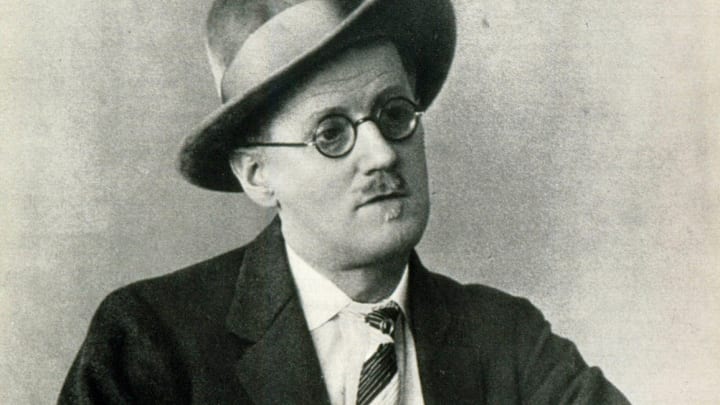Making up words is a common internet pastime, but James Joyce was way ahead of the curve in this area. In many of his works—but especially in the innovative Ulysses—the English language as it was didn’t meet Joyce’s needs, so he made up words of his own, slamming together existing terms and creating new variations. Few of these neologisms are common, though the following are recorded in the Oxford English Dictionary. They’re all due for a comeback, so consider using these 14 words in your think pieces and judicial dissents.
1. Ripripple
Reduplication might be the most fun way to make a word, as seen in terms like jibber-jabber, hocus-pocus, and choo-choo. Joyce went to the reduplication well for this word, which refers to something flowing like rippling water. Thanks to the repetition, it’s as if the word itself is riprippling.
2. Poppysmic
Poppysmic has to do with sounds produced by the smacking of the lips, and it’s easy to imagine the ever-creative Joyce licking his own lips when using this word in a neologism-heavy passage from Ulysses: “Florry whispers to her. Whispering lovewords murmur liplapping loudly, poppysmic plopslop.”
3. Pelurious
Meaning furry or hairy, pelurious is perfect for those times when writing hirsute just won’t do. Despite their tiny frames, papillons are quite pelurious.
4. and 5. Smilesmirk and Smellsip
When Joyce wrote “She smilesmirked supercilious” in Ulysses, he coined a perfect term for the current smug age, when seemingly every facial expression, word, and emoji comes with an implied eye roll. This term is similar to another Joyce-ism: smellsip, which according to the OED means “to smell and sip almost simultaneously.” In Joyce’s age and now, the most reliable way to make a new word is by gluing two old words together.
6. Mumchanciness
This obscure term is a variation of another rarity—mumchanceness—which had more to do with being mum than taking a chance when it appeared in a 1910 novel by Anthony Hope: “Perhaps his very mum-chanceness was his saving. Glib protestations would have smacked too strongly of the principal to commend the agent.” Joyce added a single syllable and considerable charm when he used it in a 1920 letter: “I am much inconvenienced by their cursed mumchanciness.” In other words, “By the ravens of Odin, why don’t they speak up?”
7. Weggebobble
This humorous alteration of vegetable is reminiscent of other respellings of words for the sake of humor, like erhmagerd or Homer Simpson’s Jebus.
8. Skeeze
Joyce used this term for peering or leering twice in Ulysses: When he described characters “skeezing round the door” and “always skeezing at those brazenfaced things on the bicycles with their skirts blowing up to their navels.” There does seem to be a relationship to the contemporary, slangy sense of skeeze as a harlot, which doesn’t pop up until 1989 in the lines of another poet, Sir Mix-A-Lot.
9. Peloothered
As Paul Dickson demonstrated in his brilliant book Drunk: The Definitive Drinker’s Dictionary, you can never have too many words for being plastered. Joyce’s contribution to the lexicon of drunkenness was peloothered, which he used in 1914’s Dubliners: “It happened that you were peloothered, Tom.” This may be a variation of an older term with the same meaning: bloothered.
10. Tattarrattat
This variation of rat-a-tat belongs to the wonderful set of onomatopoeiac words, such as boom, kaboom, buzz, whoosh, and beeeeeeep. The use in Ulysses is self-explanatory: “I knew his tattarrattat at the door.” That says so much more than knock knock, doesn’t it? A tattarrattatter is a knocker with style, and tattarrattat would also work well as a description of drumming.
11. Impotentizing
In a 1920 letter, Joyce coined a word perfect for the Viagra-centric age: “Moly could also be absinthe the cerebral impotentising (!!) drink of chastity.”
12. Pornosophical
The OED defines this Joyce-ism as “of or relating to the philosophy of the brothel.”
13. Yogibogeybox
The OED defines this woo-woo gadget as the “A room or place in which spiritualism is practised or studied; (hencefigurative) spiritualism as a philosophy or belief,” and, later, “paraphernalia of a spiritualist.” For superhero and sorcerer supreme Dr. Strange, his yogibogeybox would include the Eye of Agamotto, a classic comic-book MacGuffin.
A version of this story ran in 2015; it has been updated for 2022.
